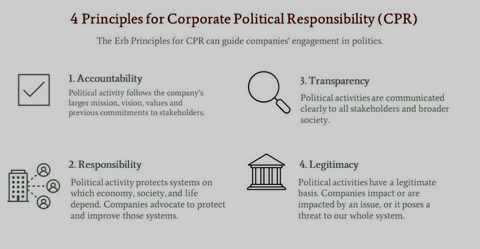The blending of politics with corporations is a complex and debated topic that involves considerations of ethics, transparency, and the role of businesses in society. Here are some perspectives on whether it should be possible to blend politics with corporations:

Arguments in Favor:
Corporate Social Responsibility (CSR): Advocates argue that corporations have a responsibility to contribute positively to society beyond just generating profits. Engaging with political and social issues allows corporations to address broader societal challenges.
Influence and Advocacy: Corporations can use their influence and resources to advocate for policies that align with their values and goals. This involvement in political discourse may lead to positive changes, such as supporting environmental regulations or social justice initiatives.
Public Engagement: Corporations often have a significant impact on the lives of individuals and communities. Engaging in political and social issues allows them to connect with their stakeholders, build trust, and demonstrate a commitment to values that resonate with their customers.
Policy Expertise: Some argue that corporations, as major stakeholders in the economy, can provide valuable insights and expertise to policymakers. Collaborative efforts between the private sector and government may lead to more informed and effective policies.
Arguments Against:
Conflict of Interest: Critics argue that corporations, driven by profit motives, may prioritize their interests over the public good. This can lead to conflicts of interest when corporations attempt to influence policies that primarily benefit them.
Undue Influence: Large corporations, particularly those with significant financial resources, may have undue influence on the political process.
Lack of Accountability: Corporate involvement in politics may raise concerns about transparency and accountability. The public may question the motivations behind corporate engagement and whether it truly serves the broader interests of society.
Potential Approaches:
Transparency and Disclosure: If corporations engage in political activities, advocates for transparency argue that they should disclose these activities to the public. This allows stakeholders to understand the nature and extent of corporate involvement in politics.
Ethical Guidelines: Corporations may establish ethical guidelines to govern their involvement in political activities. This could include a commitment to promoting social and environmental responsibility, avoiding practices that harm society, and ensuring transparency in political contributions.
Collaboration with Nonprofits: This can be a way to contribute to societal well-being without engaging directly in political lobbying.
Ultimately, the question of blending politics with corporations involves balancing the potential benefits of corporate engagement in societal issues with concerns about ethics, accountability, and the integrity of the democratic process.
